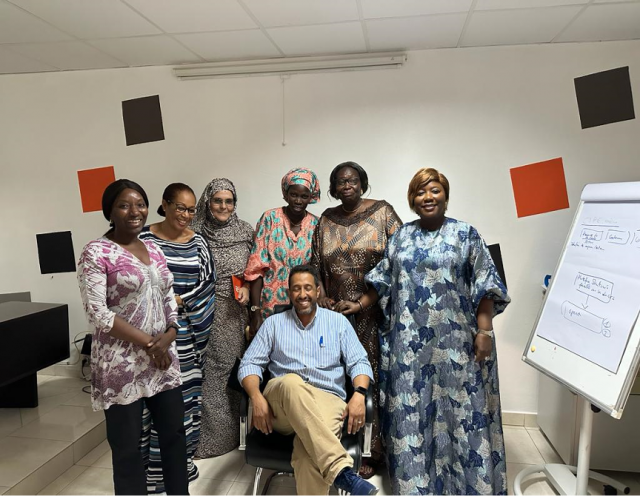
Sylvie Dossou, CIPE Senior Program Manager
Coulibaly Aissata Toure, President of the Network of Women Economic Operators of Mali
Teine Noueiss
Ramatoulaye Diaw, business leader in Mauritania
Roinouba Mbangodji, business leader in Chad
Assetou Ouedraogo, Busisness leader in Burkina Faso
Front and center: Haroune Sidatt, CIPE Mauritania Country Director
I recently traveled to Mauritania for the first time. As the newest senior program manager for the Center for International Private Enterprise, in West Africa, I was there to meet with our local team, partners, and beneficiaries, to gain a deeper understanding of the fast-moving events in this unstable region. Over the subsequent four days I had the privilege of meeting five tenacious businesswomen, each embodying the challenges and dreams of the Sahel region and pushing for those goals through CIPE‘s Sahel Business Coalition for Inclusive Partnerships program. The program empowers local leaders to improve economic opportunity for all. Three of the women hailed from Burkina Faso, Tchad, and Mali, while the other two were Mauritanian natives.
These countries, bound by more than just borders, share a common thread. Except for Mauritania they are landlocked, and all are part of the Sahel, a region suffering from an unparalleled security crisis with eight coups in the past three years. The region also suffers from drought and food insecurity and is projected to be one of the areas most severely affected by global climate change in the coming years. As many as 80% of its people live on less than $2 a day, which means poverty is more widespread here than in most other regions of Africa. This crisis has been exacerbated by weak governance, marked by corruption, democratic erosion, and human rights infringements.
The surge of violent extremism in the Sahel has diverted crucial funds from public services to combat armed factions. This change, coupled with limited economic opportunities, has propelled youth towards migration and, alarmingly, extremism. Democratic governments’ inability to serve their citizens has precipitated the coups. The recent political upheaval and the consequential economic sanctions from ECOWAS (the Economic Community of West African States) have further strained these nations, isolating them from regional and global interactions.
Amidst this backdrop, in the heart of Nouakchott at CIPE’s Mauritania office, these women, entrepreneurs as well as leaders of business associations, convened with a singular purpose: pioneering an environment in Sahel countries that promotes business-led advocacy for peace and good governance, as well as inclusive policy discourse.
As I introduced to CIPE’s mission their determination was palpable. Our discussions revolved around market-centric reforms that could support their businesses and about fostering dialogues to advocate for peace. But this was more than just business. It was about amplifying the voices of these women, allowing them to articulate their struggles and ambitions.
Their stories painted a vivid picture of the aftermath of political upheavals: the challenges of accessing funds, the stifling of businesses due to resource scarcity, and barriers to travel and procurement. And, of course, the destabilizing impact of the coups, which have wiped out entire economic sectors, said Coulibaly Aissata Toure, President of the Network of Women Economic Operators of Mali.
“In the crafts industry, women primarily worked with hotels where they made many sales, especially in tourist regions,” Aïssata told the group. “However, due to these horrendous security concerns tourism has declined and consequently the crafts industry has collapsed. All these women who worked with leather, skins, beads, and jewelry no longer have customers. Then, we went through the COVID crisis for two years, and now we are facing an embargo and the country’s borders are closed!”
CIPE’s “Business for Peace” strategy is designed as a beacon of hope in such a challenging landscape. By recognizing the symbiotic relationship between peace, business, and democracy, this approach aims to tackle the socio-economic and governance issues particular to countries confronting security challenges and conflict. CIPE’s emphasis on the private sector’s role, especially women, youth, and SMEs, in peacebuilding is a huge support to their commitment to fostering sustainable growth and stability.
CIPE’s collaboration with these women underscores the pivotal role the business community can play in championing democracy and countering autocratic tendencies. By actively participating in discussions on democratic governance and supporting the rule of law and democratic institutions, these Sahelian women are making a difference.
As our meeting drew to a close, I saw more than just gratitude in their eyes. I witnessed hope and empowerment. With CIPE’s backing, these women are not merely business leaders; they are the vanguards of change, poised to redefine the Sahel’s narrative.
Published Date: October 11, 2023
